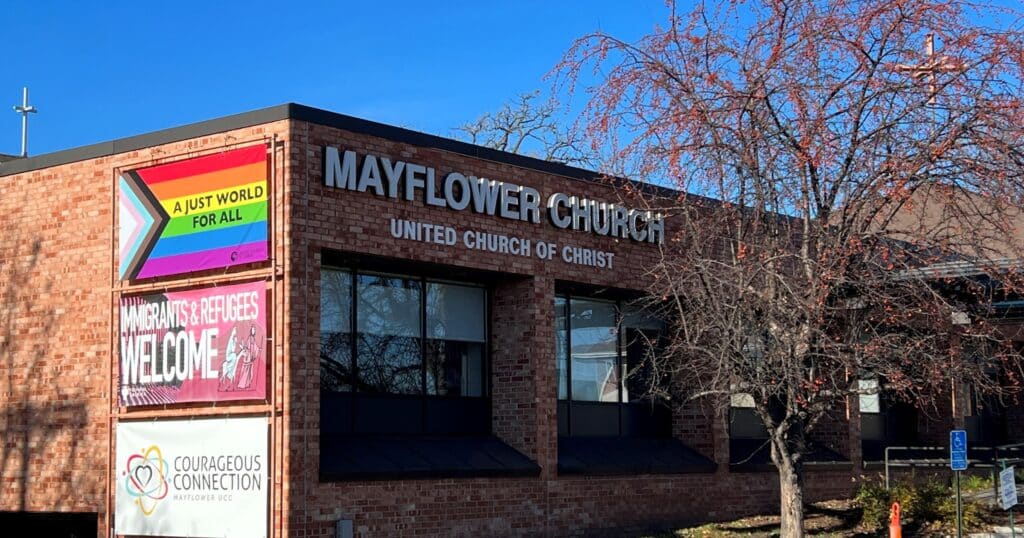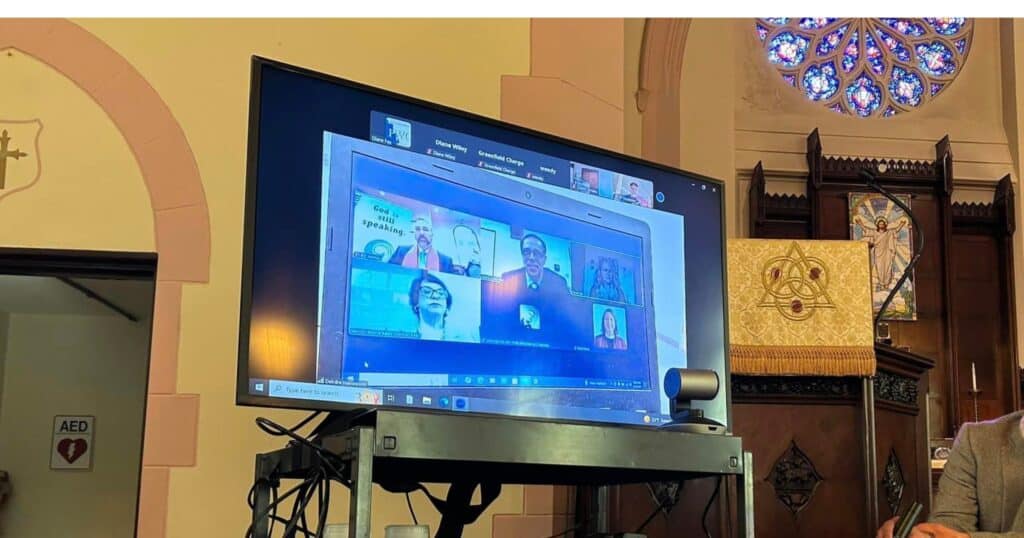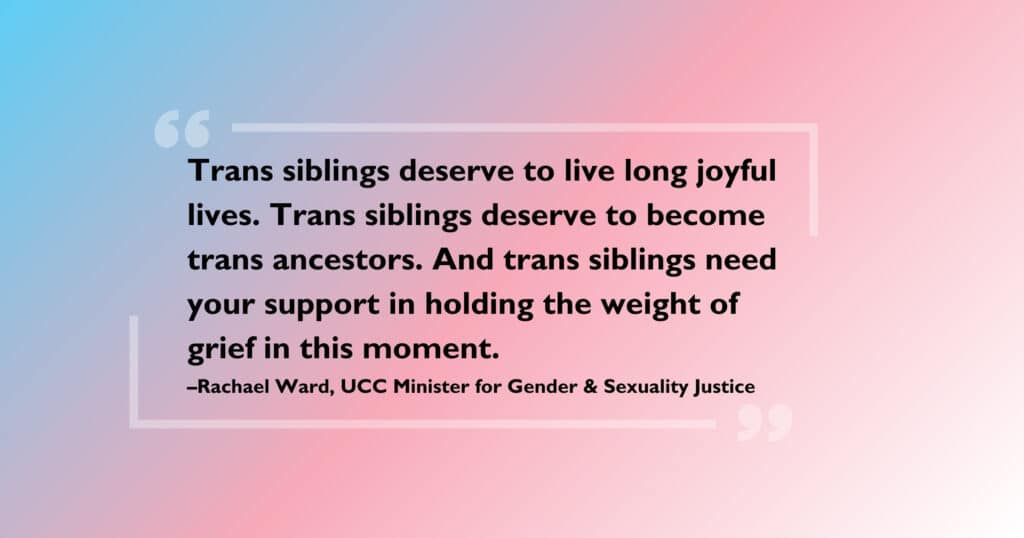‘Who we want to be’: Mayflower Church in Minneapolis considers reparative work on church name
What’s in a name? Mayflower Congregational United Church of Christ is taking a deep dive into this question.
As the congregation in Minneapolis nears its 100-year anniversary, it has taken up the task of intentionally considering the association of its name with the 17th-century ship that transported Pilgrims across the Atlantic.
The move to address the Mayflower name has been spurred by the church’s long commitment to justice work, its upcoming anniversary and its location two miles from the site where George Floyd was killed by police in 2020 — an area that has become known as George Floyd Square.
“I drive by there every day, and it’s a reminder to me that there’s an international reckoning that’s happening all over the world in terms of race and colonialism, and that’s right in our city,” said the Rev. Sarah Campbell, Mayflower’s team lead minister. “As a church, if we were not doing this deep penitential or reckoning journey, it would be wrong. We are called to it.”
As part of this work, Campbell is making a pilgrimage to Plymouth, Mass., during the week of the Thanksgiving holiday and publishing daily reflections in a blog created for the journey, Nov. 20-29, seeking to share this personal journey with her congregation and others across the denomination.
History of a name
A small group within Mayflower began advocating for a name change several years ago. Recognizing the variety of strong feelings associated with the idea, the church council created a committee to lead a two-year process of evaluating a name change.
Now six months into the process, Leo Erstad, the church’s moderator, is confident that this timeline has helped create the amount of dialogue and opportunities to be heard that are needed.
“One of most interesting parts over the past few months is that some people initially opposed or in favor of the name change have become open to the other side,” he said. “We have a generative dialogue going back and forth, and people are less sure than they were months before.”
A name to newcomers
Newcomers and people unfamiliar with the church have been one consideration around the church’s name.
Church leaders led a series this summer focused on symbols in the church, which led to relocating a major art piece depicting pilgrims with a cross and ship from prominent display in their social hall to a smaller room.
Campbell noted that a name is one among other symbols.
“When you’re coming here as a church member, you don’t often see them anymore, but a newcomer does,” she said. “We’re starting to become aware of how these can strike newcomers and aren’t very welcoming.”
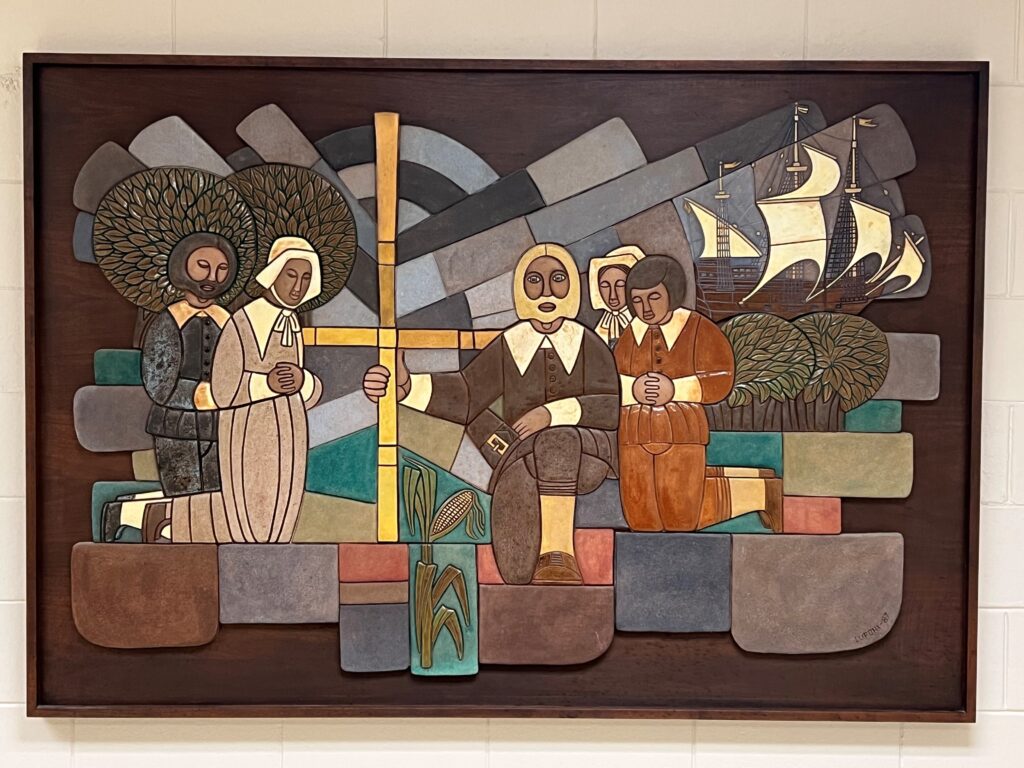
Erstad says that some people unfamiliar with the church and its involvement with justice issues assume that it’s conservative or named after a slave ship. He explained that this often leads to conversations about the name rather than the ministries and work of the church. “It’s a distraction,” he added, specifically noting the resistance the name creates for people from Indigenous communities.
“People who want to keep the name talk about the name’s reputation,” he said. “Others are saying it’s a historical reflection to a long time ago and doesn’t reflect who we want to be as far as creating a more diverse community.”
‘The roots of our identity’
Some members deeply value the reputation associated with the Mayflower name. Campbell shared stories of people who were baptized in Mayflower and those with family ashes placed there.
“It’s very much a pastoral care issue for those feeling like this is the name of the place they’ve been going,” Campbell said. “I always ask for people’s stories with Mayflower — there’s profound history here.”
Church member Dawn Baker said that, for many, the name “goes to the roots of our identity, which includes good stuff in our history like abolition” and “really heartfelt values that are held with the name.”
She said she sings in the choir with people who have attended Mayflower since the 1940s and have a strong resistance to changing the name.
“It has to do with what we’ve been known for as a cool, out-there church,” Baker said. “People are afraid we would lose some of who we’ve been and who we are.”
“If you were to ask people about the ideology of our church, you’d get a common answer across the congregation,” Erstad said. “Does our name reflect that? You’re going to get more disagreement on that.”
Erstad has witnessed the fruitfulness that has come from committee leader Kate Andrews van Horne compiling a collective list of positive and negative considerations around the name change and bringing each into broader discussion. He hopes that this process will lead to a broad consensus.
“One goal council has is that when it comes time to vote, whether people vote for or against the name change, everyone will say they have been fully heard, and whether they agree or disagree, that this community is important enough to them that they’re not going to leave just because they didn’t support the decision,” he said.
Nearby ‘Mayflower’ change
The early childhood center founded by Mayflower Church changed its name in 2022 from Mayflower Early Childhood Center to Creekside Montessori School. It has become an independent nonprofit organization located in the church building.
Baker, who served as the school’s board chair at the time, said that the idea to change the name gained traction after the center’s staff and board completed a series of equity, diversity and antiracism trainings.
“A very active parent brought to our attention that there were people out there who wouldn’t walk in the door because of the name Mayflower, so we started to look at that,” she said. “It wasn’t without controversy either.”
Baker said the board weighed the name’s history together with its implications in the present and presented the decision to the Mayflower Church congregation and council.
“We did some education from the pulpit on why historical accuracy is meaningful to our members, and yet it’s keeping people from walking in and going to school,” she said. “We felt it was the higher ethic to remove that barrier.”
They chose the name Creekside, which matches the name of the affordable housing community built on the church property in 2010, where several of the school’s staff and children live.
Pilgrimage to the Mayflower
As the church moves through its name change consideration, Campbell felt compelled to interrogate the personal connections it holds for her.
“I’m a fourth-generation Congregationalist, and many members of my family are clergy in the UCC; it’s been so much part of my identity,” she said. “At this time of reckoning about our history, I also need to do this personally in this denomination that I love so much.”
This will be the focus of her pilgrimage to Plymouth, where she plans to visit the Mayflower ship replica and Plymouth Harbor, among other sites, and attend the National Day of Mourning held annually near Plymouth Rock by Indigenous people and allies on the U.S. Thanksgiving holiday.
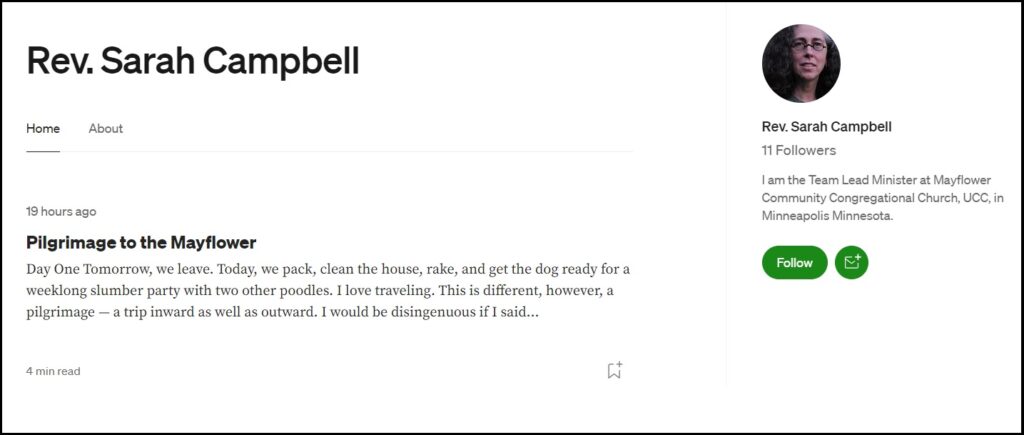
“Thanksgiving Day is a reminder of the genocide of millions of Native people, the theft of Native lands and the erasure of Native cultures … It is a day of remembrance and spiritual connection, as well as a protest against the racism and oppression that Indigenous people continue to experience worldwide,” the Day of Mourning event description reads.
Campbell said that in contrast to past sabbaticals where she has done heavy research and intellectual work, she intends to engage with this journey on an emotional and spiritual level.
“I’m really trying to honor the historical complexity and not just go from one direction to the other when there’s complexity there,” she said. “The Pilgrims were remarkable in how they were fleeing church-state and seeking freedom of religion … But then, clearly, 90% of the Indigenous people wiped out from disease, taking land and near-genocide is a big part of the story. We can’t oversimplify it.”
Sharing the questions
It’s important to Campbell to share the work of their church more broadly, even as they wrestle through the questions. This is what inspired her to reflect and blog publicly during her trip.
“Similar to how we’ve done a lot of green [environmental justice] stuff, we don’t just do it quietly but try to think of movements, hoping to help stir a little bit of a movement in the denomination,” she said.
Mayflower is not alone. Other UCC churches have names with similar historical associations like Pilgrim, Plymouth, Colonial.
“It becomes increasingly ironic to me that the arguably most progressive Christian denomination in the country, historically with all these ‘firsts,’ with all the reckoning with colonialism around the world, we’re the ones that have the most colonial-named churches,” Campbell said. “But I’m attached to those kinds of names with all the pride of Congregational heritage. That’s where it’s a deeper pilgrimage.”
She notes how she’s considering the significance of name changes in Scripture as the church approaches its 100th anniversary — often new names align with one’s future and who they want to be.
“A really important piece, which is also so basic, is we pray for discernment of what God is calling in this time as communal discernment,” she said.
Follow along with Campbell’s week-long Mayflower pilgrimage through her blog.
Content on ucc.org is copyrighted by the National Setting of the United Church of Christ and may be only shared according to the guidelines outlined here.
Related News
All four Pennsylvania conferences pass motion toward one combined conference
On Nov. 9, each of the four United Church of Christ conferences in Pennsylvania passed the...
Read MoreFlorida UCC churches organize helping hands in wake of recent hurricanes
The gulf coast of Pinellas County, Florida recently suffered a destructive double whammy...
Read MoreCommentary: Honoring queer lives, remembering trans siblings lost
This week marks Transgender Day of Remembrance (TDOR), an annual time of mourning and honoring...
Read More